dis-, di-, dif-
(Latin: separation, apart, asunder; removal, away, from; negation, deprivation, undoing, reversal, utterly, completely; in different directions)
The meaning of dis- varies with different words; dif-, assimilated form of dis- before f; di-, form of dis- before b, d, g, l, m, n, r, and v.
The scattering of light in many directions as the result of reflection from an uneven surface or passage though a translucent material: Jane wanted to have a thin curtain in front of her window to produce diffusion in the living room so she could read without the glaring sunlight from outside blinding her.
diffusive (adjective), more diffusive, most diffusive
1. Having the quality of spreading by flowing, as liquid substances or fluids; or of dispersing, as minute particles.
Water, air, and light; dust, smoke and odors, are diffusive substances.
2. Extended; spread widely; extending in all directions; extensive; as diffusive charity or benevolence.
diffusively (adverb), more diffusively, most diffusively
Spread widely, extensively, or in every way.
digest
digestion
digress (verb), digresses; digressed; digressing
To leave the main subject temporarily in speech or writing: The politician digressed from his topic when someone yelled in opposition to what he was saying.
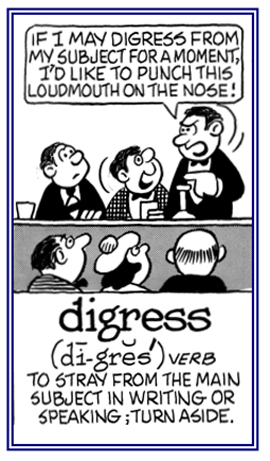
© ALL rights are reserved.
Go to this Word A Day Revisited Index

Go to this Word A Day Revisited Index
so you can see more of Mickey Bach's cartoons.
A spoken topic or written document about something which is different from the main subject being discussed: The speaker at the conference presented many humorous digressions even though it was supposed to be a serious financial report.
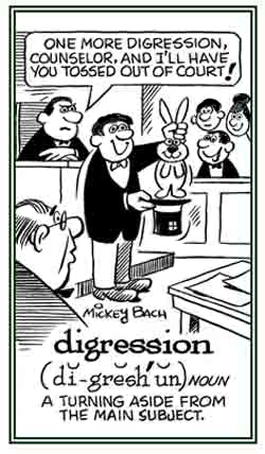
© ALL rights are reserved.
Go to this Word A Day Revisited Index
On TV, the political commentator was revealing the social and political digressions that the senator had committed while he was a member of the U.S. Congress.

Go to this Word A Day Revisited Index
so you can see more of Mickey Bach's cartoons.
dilapidate (di LAP i dayt") (verb), dilapidates; dilapidated; dilapidating
1. To cause or to collapse into a state of partial or total destruction, decay, or disrepair: Many homes and buildings have been dilapidated by the fires that took place in Tom's neighborhood and beyond into an extended geographical area.
2. Etymology: from Latin dilapidare, "to demolish, to destroy"; from di-, dis', "apart" + lapidare, "to throw stones"; from lapis, lapid-, "stone".
2. Etymology: from Latin dilapidare, "to demolish, to destroy"; from di-, dis', "apart" + lapidare, "to throw stones"; from lapis, lapid-, "stone".
dilapidated (di LAP i day" tid) (adjective), more dilapidated, most dilapidated
A reference to a deplorable or terrible condition or situation: Sam's car was in a dilapidated, or battered, shape after the truck rammed into it on the street where it was parked.
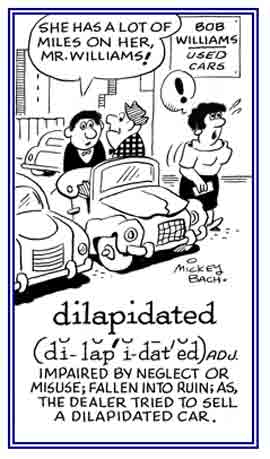
© ALL rights are reserved.
Go to this Word A Day Revisited Index

Go to this Word A Day Revisited Index
so you can see more of Mickey Bach's cartoons.
The disrepair for which a tenant is usually liable when he or she has agreed to leave a house in good condition: When Jack and Jill moved to a new condo, they had to renew the dilapidations that occurred over the many years that they had lived there.
2. The condition of deterioration or being in a situation of disrepair: The old church was in a state of dilapidation, needing a lot of money and work to fix the walls and the ceiling.
2. The condition of deterioration or being in a situation of disrepair: The old church was in a state of dilapidation, needing a lot of money and work to fix the walls and the ceiling.
dilatediffer
dilatory (adjective), more dilatory, most dilatory
1. A reference to an inclination or intention to waste time, to cause a delay, or to lag behind: Because of the auto accident on the street, it took Monroe a great deal of dilatory time to get home after work.
2. Using cautious slow strategy to wear down the opposition; and so, avoiding direct confrontation and deferring a decision: The congressman, Mr. Gould, used a dilatory strategy to keep the bill from being passed.
3. Etymology: from Latin dilatorius; from dilator, "procrastinator", from dilatus, the past participle form of differe, "to delay".
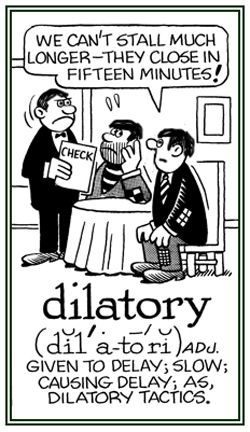
© ALL rights are reserved.
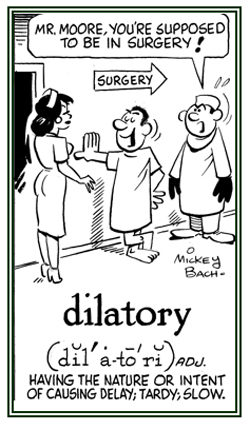
© ALL rights are reserved.
Go to this Word A Day Revisited Index
2. Using cautious slow strategy to wear down the opposition; and so, avoiding direct confrontation and deferring a decision: The congressman, Mr. Gould, used a dilatory strategy to keep the bill from being passed.
3. Etymology: from Latin dilatorius; from dilator, "procrastinator", from dilatus, the past participle form of differe, "to delay".


Go to this Word A Day Revisited Index
so you can see more of Mickey Bach's cartoons.
dilectology
The study of dialects; that branch of philology which treats of dialects.
1. A situation in which someone must choose one of two unsatisfactory options: Because of the bad weather, Lester and his family were in a dilemma as to when they should plan to go on their vacation.
2. In logic, a form of reasoning that, though valid, leads to two undesirable selections: When George was trying to find at least three different definitions for each of the words that he was assigned to find for his English class, his dilemma was that the three dictionaries were giving the same results without any significant variations in contents from one to the other.
3. Etymology: from Late Latin dilemma, which came from Greek dilemma, "double proposition".
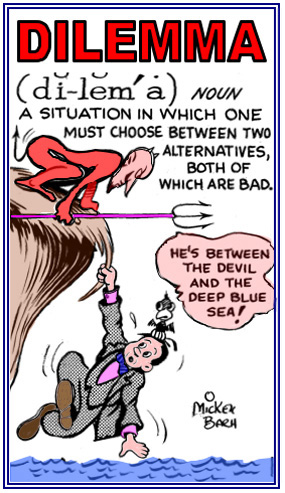
© ALL rights are reserved.
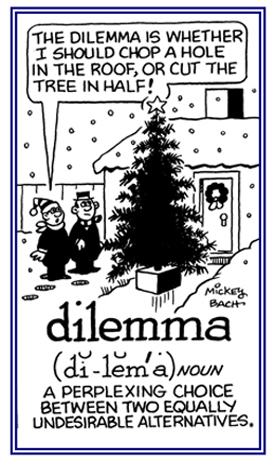
© ALL rights are reserved.
Go to this Word A Day Revisited Index
2. In logic, a form of reasoning that, though valid, leads to two undesirable selections: When George was trying to find at least three different definitions for each of the words that he was assigned to find for his English class, his dilemma was that the three dictionaries were giving the same results without any significant variations in contents from one to the other.
3. Etymology: from Late Latin dilemma, which came from Greek dilemma, "double proposition".
This is a technical term in rhetoric, from di-, "two" + lemma, "premise, anything received or taken" from the root of lambanein, "to take".


Go to this Word A Day Revisited Index
so you can see more of Mickey Bach's cartoons.
1. A constant and earnest effort to accomplish what is undertaken; persistent application and endeavor.
2. Conscientiousness in paying proper attention to a task or giving the amount of care required in a given situation.
3. Etymology: from Old French diligence, "attention, care"; from Latin diligentia, "attentiveness, carefulness"; from diligentem, diligens, "attentive, assiduous, careful"; from diligere, "to value highly, to love, to choose"; from dis-, "apart" + legere, "to choose, to gather".
2. Conscientiousness in paying proper attention to a task or giving the amount of care required in a given situation.
3. Etymology: from Old French diligence, "attention, care"; from Latin diligentia, "attentiveness, carefulness"; from diligentem, diligens, "attentive, assiduous, careful"; from diligere, "to value highly, to love, to choose"; from dis-, "apart" + legere, "to choose, to gather".


